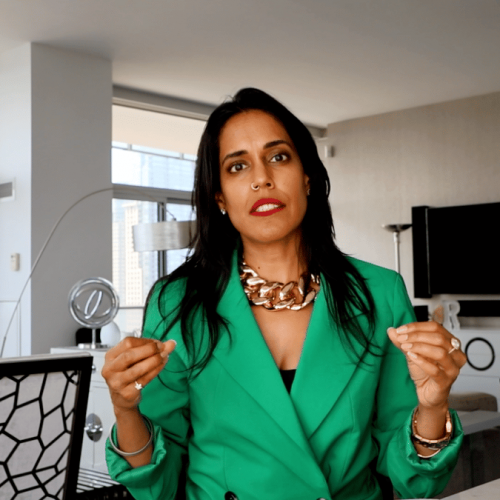
When I was in my twenties and early thirties, I worked very hard to make sure that others believed I was perfect. In fact, I became a master at living as my Performing Self — a self I created as a shield against the negative judgments I thought others would have about the real me.
The Performing Self I created was all about appearing flawless — strong, confident, positive, and successful. In my attempt to be perceived as perfect, I changed how I dressed, how I spoke, how I behaved, who I associated with, the content I shared, the activities I engaged in, and more, conforming to an idea about perfection that wasn’t at all true to me. My conformity was exacerbated by my work life — I worked in an elite legal environment, where the bar was set high in every area and the criteria for “fitting in” was both narrow and fixed.
During these years, I did a mix of things to mask what I perceived to be my “imperfections”. I fixated on dressing impeccably to signal class privilege, attractiveness, and that I had my shit together. When getting to know people, I often hid behind a mask that covered up my insecurities about my abilities, my cultural background, and my socioeconomic roots. I also conformed in how I spoke so that I’d fit in with certain social groups (taking on a more formal tenor, dropping the pitch of my voice, and using fancier words — essentially, speaking the Queen’s English).
I didn’t want anyone to see my imperfections or my vulnerabilities. I desperately wanted to fit in, and I wanted to protect myself from the pain of being negatively judged by others. All the while, I felt deeply flawed, damaged, and effed up on the inside.
And let me tell you — it was exhausting.
Protecting My Wounds From Childhood
When I think about why I was so dedicated to upholding this image of perfection, I know it’s connected to the feelings of social alienation, rejection, and inferiority that I felt because of the childhood bullying I experienced and the parenting I received. A lot of research has been done about the numerous long-term impacts of childhood bullying. Bullying can have a profound adverse impact on mental health and other areas for those who experience it.
Being bullied because of who I was (Brown, smart, not as wealthy as the other kids), coupled with messages from my parents that I needed to be quieter, less outspoken, and less expressive (basically someone other than who I was), caused me to carry feelings of woundedness and worthlessness into adulthood.
It’s no wonder I wanted to protect myself from feeling more of this pain. But the truth is that, instead of protecting me, striving for perfection was actually causing more damage, because I wasn’t living my truth.
Nobody’s Perfect
I’ve come a long way in embracing my imperfections and allowing them to show by being my Authentic Self, but from time to time I’ll catch myself saying some version of, “I’m so fucked up,” and berating myself for my flaws. My boyfriend will often catch me when I’m self-flogging and remind me that I’m “amazing” just the way I am and that everyone is imperfect — and that it’s possible to be both imperfect and amazing.
A lot of us do this to ourselves. We believe we should be perfect, and we measure ourselves against an impossible standard. While believing this, we also worry that if we show others that we don’t live up to this standard, we’ll experience rejection and alienation. But every single one of us is imperfect — perfectly imperfect and imperfectly perfect. The greatest gift we can give ourselves is the acceptance of this fact.
Transformative Things Happen When We Accept Our Imperfections
When we accept our imperfections, our lives can transform in amazing ways. Firstly, we can practice self-compassion: that is, show ourselves the compassion we would show others, which has numerous mental, physical, and spiritual benefits. In her book Self-Compassion: The Proven Power of Being Kind to Yourself, Dr. Kristin Neff teaches that self-compassion flows from both being kind to ourselves and recognizing our common humanity — that each of us is imperfect and experiences suffering.
Secondly, when we accept our imperfections, we’re better able to practice authenticity. When we’re committed to living as our whole, true, authentic selves (the good, bad, and ugly), we’re free of the exhausting dance that is performing. And when we’re tuned in to our authenticity, we know how to behave at any given moment because we’re anchored to our values. We no longer have to pour our energy into being, doing, and saying what we think others want us to. We’re free to be imperfect.
So what can you do to take a step towards living as your authentic, imperfect self? Start by tuning into the areas of your life where you might be performing (the Seven Behavioral Dimensions, as I call them) and start making small changes. Embrace the things that make you unique and different! Be smart or outspoken or wear bright colors if that’s what feels right for you.
There’s no right way to live. Nobody’s perfect!

I'm Ritu.
I’m an award-winning life coach, empowerment speaker, author, and inclusion expert dedicated to helping you live your best life.

Join MY COMMUNITY
Sign up for my mailing list to get free inspiration and tools straight to your inbox!
Top Posts
Related Posts

Dig deep into your journey to belong.
Be the first to learn about my authenticity and empowerment goodies and get them straight to your inbox.








